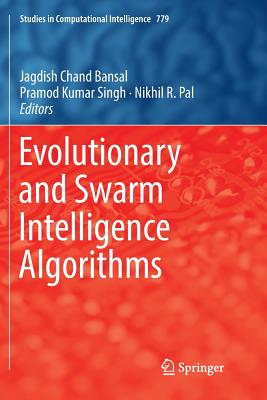Swarm Intelligence (Hardcover)
暫譯: 群體智慧 (精裝版)
Russell C. Eberhart, Yuhui Shi, James Kennedy
- 出版商: Morgan Kaufmann
- 出版日期: 2001-03-26
- 售價: $4,330
- 貴賓價: 9.5 折 $4,113
- 語言: 英文
- 頁數: 512
- 裝訂: Hardcover
- ISBN: 1558605959
- ISBN-13: 9781558605954
-
相關分類:
Machine Learning
海外代購書籍(需單獨結帳)
買這商品的人也買了...
-
 IBM 80X86 MASM 6.X 組合語言實務
IBM 80X86 MASM 6.X 組合語言實務$450$383 -
 SQL Server 2000 資料庫設計與系統管理
SQL Server 2000 資料庫設計與系統管理$650$514 -
 FrontPage 2002 中文版實務
FrontPage 2002 中文版實務$480$240 -
 C++ Primer, 3/e 中文版
C++ Primer, 3/e 中文版$980$833 -
 Introduction to Algorithms, 2/e (Hardcover)
Introduction to Algorithms, 2/e (Hardcover)$990$970 -
 Digital Image Processing, 2/e(IE)(美國版ISBN:0201180758)
Digital Image Processing, 2/e(IE)(美國版ISBN:0201180758)$1,150$1,127 -
 LPI Linux 資格檢定 (LPI Linux Certification in a Nutshell)
LPI Linux 資格檢定 (LPI Linux Certification in a Nutshell)$880$695 -
 PhotoImpact 8 影像大不同
PhotoImpact 8 影像大不同$490$245 -
 作業系統概念 (Operating System Concepts, 6/e Windows XP Update)
作業系統概念 (Operating System Concepts, 6/e Windows XP Update)$780$741 -
 資料庫系統原理第三版 (Fundamentals of Database Systems, 3/e)
資料庫系統原理第三版 (Fundamentals of Database Systems, 3/e)$760$646 -
 Office XP 快易通
Office XP 快易通$199$179 -
 Windows Server 2003 系統建置篇
Windows Server 2003 系統建置篇$590$466 -
 重構─改善既有程式的設計
重構─改善既有程式的設計$720$612 -
 System Software: An Introduction to Systems Programming, 3/e (IE-Paperback)
System Software: An Introduction to Systems Programming, 3/e (IE-Paperback)$980$960 -
 辦公好幫手系列-Word 2003 文書處理與排版實務
辦公好幫手系列-Word 2003 文書處理與排版實務$490$245 -
 Dreamweaver MX 2004 魔法書中文版
Dreamweaver MX 2004 魔法書中文版$490$417 -
 人月神話:軟體專案管理之道 (20 週年紀念版)(The Mythical Man-Month: Essays on Software Engineering, Anniversary Edition, 2/e)
人月神話:軟體專案管理之道 (20 週年紀念版)(The Mythical Man-Month: Essays on Software Engineering, Anniversary Edition, 2/e)$480$379 -
 JSP 2.0 技術手冊
JSP 2.0 技術手冊$750$637 -
 CCNA 認證教戰手冊 Exam 640-801 (CCNA Cisco Certified Network Associate Study Guide, 4/e)
CCNA 認證教戰手冊 Exam 640-801 (CCNA Cisco Certified Network Associate Study Guide, 4/e)$780$663 -
 Windows 驅動程式設計指南 (Programming the Microsoft Windows Driver Model, 2/e)
Windows 驅動程式設計指南 (Programming the Microsoft Windows Driver Model, 2/e)$890$703 -
 軟體加密原理與應用
軟體加密原理與應用$450$405 -
 Fundamentals of Computational Swarm Intelligence
Fundamentals of Computational Swarm Intelligence$6,700$6,566 -
 Visual C# 2005 程式開發與介面設計秘訣
Visual C# 2005 程式開發與介面設計秘訣$750$637 -
 現代嵌入式系統開發專案實務-菜鳥成長日誌與專案經理的私房菜
現代嵌入式系統開發專案實務-菜鳥成長日誌與專案經理的私房菜$600$480 -
 $2,240Computational Intelligence: Concepts to Implementations (Hardcover)
$2,240Computational Intelligence: Concepts to Implementations (Hardcover)
相關主題
商品描述
Traditional methods for creating intelligent computational systems
have
privileged private "internal" cognitive and computational processes.
In
contrast, Swarm Intelligence argues that human
intelligence
derives from the interactions of individuals in a social world
and further,
that this model of intelligence can be effectively applied to
artificially
intelligent systems. The authors first present the foundations of
this new
approach through an extensive review of the critical literature in
social
psychology, cognitive science, and evolutionary computation. They
then show
in detail how these theories and models apply to a new
computational
intelligence methodology—particle swarms—which focuses
on adaptation as the
key behavior of intelligent systems. Drilling down
still further, the authors
describe the practical benefits of applying particle
swarm optimization to a
range of engineering problems. Developed by
the authors, this algorithm is an
extension of cellular automata and
provides a powerful optimization,
learning, and problem solving method.
This important book presents valuable new insights by exploring
the
boundaries shared by cognitive science, social psychology, artificial
life,
artificial intelligence, and evolutionary computation and by applying
these
insights to the solving of difficult engineering problems. Researchers
and
graduate students in any of these disciplines will find the
material
intriguing, provocative, and revealing as will the curious and
savvy
computing professional.
Contents
Introduction
Part 1: Foundations
Life and Intelligence
Optimization by Trial and Error
On our Nonexistence as Entities
Evolutionary Computation Theory and Paradigms
Humans - Actual, Imagined
and Implied
Thinking is Social
Part 2: Particle Optimization and
Collective Intelligence
The Binary Particle Swarm
Variations and
Comparisons;
Applications
Implications and Speculations
Conclusions
商品描述(中文翻譯)
傳統的智能計算系統創建方法偏重於私人的「內部」認知和計算過程。相對而言,群體智慧主張人類智慧源於個體在社會世界中的互動,並進一步指出這種智慧模型可以有效地應用於人工智能系統。作者首先通過對社會心理學、認知科學和進化計算的關鍵文獻進行廣泛回顧,介紹了這一新方法的基礎。接著,他們詳細展示了這些理論和模型如何應用於一種新的計算智能方法論——粒子群,該方法論將適應性視為智能系統的關鍵行為。更深入地,作者描述了將粒子群優化應用於各種工程問題的實際好處。這一算法是由作者開發的,作為細胞自動機的擴展,提供了一種強大的優化、學習和問題解決方法。
這本重要的書籍通過探索認知科學、社會心理學、人工生命、人工智能和進化計算之間的共同邊界,並將這些見解應用於解決困難的工程問題,提供了有價值的新見解。這些學科的研究人員和研究生將會發現這些材料引人入勝、挑釁且啟發性十足,對於好奇且精明的計算專業人士來說也是如此。
內容
引言
第一部分:基礎
生命與智慧
通過試錯進行優化
關於我們作為實體的不存在
進化計算理論與範式
人類 - 實際的、想像的和暗示的
思考是社會性的
第二部分:粒子優化與集體智慧
二元粒子群
變化與比較;
應用
影響與推測
結論











